Conductor Sir Georg Solti
Two Conversations with Bruce Duffie
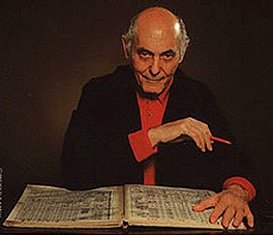
Though the spelling remained Georg, Solti (later Sir Georg) insisted it
be pronounced George. He was a human dynamo, always doing many
things and keeping them all running at top speed. His
performances were known for rhythmic precision, and though his beat
looked somewhat clumsy, it was easy to follow and made for exact
entrances and cut-offs.
He was kind to the press, but kept us all at a distance. He did
not particularly enjoy doing interviews, and only allowed a few minutes
for anyone. I was privileged to have been given two such
audiences, and the results were used on several occasions, all of which
are enumerated in the credit at the very end of this presentation.
What follows is a compilation of the two meetings which was published
as the Cover Article in The
Instrumentalist magazine in October, 1995. It has been
slightly re-edited; a few additional details have been added and the
links have been placed in the introduction.
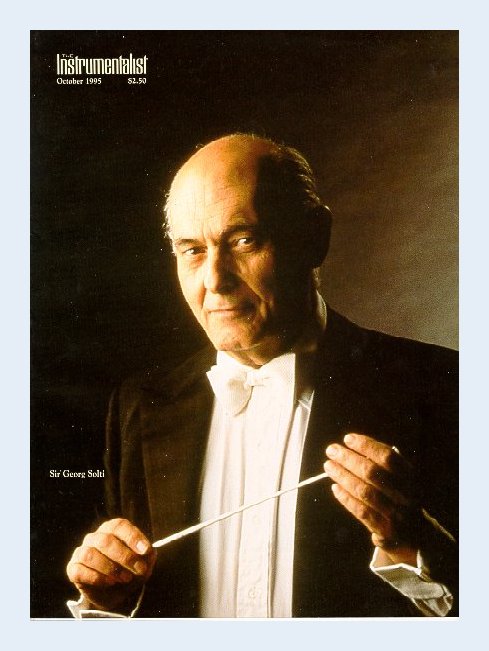
Born in Budapest in 1912, Sir Georg Solti studied piano, composition,
and conducting with Bartók, Dohnányi, Kodály, and
Leo Weiner. His concert debut was as a pianist, but shortly
thereafter he became the conductor of the Budapest Opera. In 1935
he assisted Bruno Walter at the Salzburg Festival, and in 1936-37
Toscanini selected Solti as one of his assistants, and can be heard
playing the gockenspiel in the performances of Mozart’s Magic Flute. Before
the outbreak of World War II, Solti went to
Switzerland and turned again to the piano for his livelihood. In
1946 the American military government invited him to conduct a
performance of Beethoven’s Fidelio
in Munich. This led to an
appointment as music director of the Bavarian State Opera. He
later served as music director of the Frankfurt Opera and the Royal
Opera House, Covent Garden. He first led the Chicago Symphony
Orchestra at the Ravinia Festival in 1954, and later returned for guest
performances. He was with the Lyric Opera of Chicago for two
seasons. In 1956 he conducted Salome
with Inge Borkh, Die Walküre
with Birgit Nilsson [see my interview with Birgit
Nilsson], Paul Schoeffler and Ardis Krainik as Rossweisse, Don Giovanni with Eleanor Steber
and Nicola Rossi-Lemeni and La Forza
del Destino with Renata Tebaldi, Richard Tucker and Ardis
Krainik as Curra [see my interview with Ardis
Krainik]; the following season he conducted The Marriage of Figaro with Steber
and Walter Berry [see my interview with Walter
Berry], Un Ballo in
Maschera and Don Carlo
both with Jussi Bjoerling and Anita Cerquetti. It was not until
December 1965 that he conducted during the
regular season at Orchestra Hall. From 1969 to 1991 he was music
director of the Chicago Symphony Orchestra and currently is music
director laureate. He is also conductor emeritus of the London
Philharmonic Orchestra, having been principal conductor from 1979 to
1984.
Bruce Duffie: Having
conducted orchestras all over the world, can
you rate the Chicago Symphony along with some of the other great
orchestras?
Sir Georg Solti: Of
course I am not quite objective, but in my
mind there are maybe two major competitors, and that’s all. I
regard three orchestras — Chicago, Berlin
Philharmonic and Vienna
Philharmonic — in the same class. These
are the three top
orchestras in the world, and it is a question of taste as to which you
prefer. Naturally you know my preference. It is a great
privilege because in the last three months I have conducted
all three of these orchestras, so I am probably best equipped to answer
this question. They are all three marvelous orchestras. In
some, this section is better here or better there, but the total
impression is that each is a joy to
conduct. There are many other first-class orchestras, some I know
and some I don’t know, but I suppose these are the three top orchestras
in the world today. It is not a football league so I won’t
rank them one, two, three,
BD: When you
conduct the Vienna Philharmonic or the Berlin
Philharmonic, do you have enough time to put your stamp on the music
you are playing?
Sir Georg: Of
course; [with a sly grin] I have the best post office in the business!
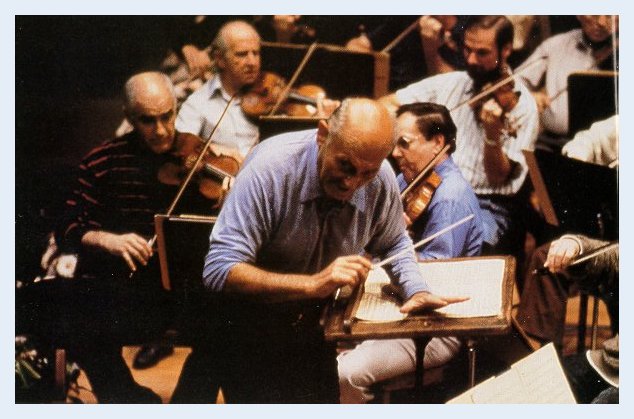 BD: Well, when you
prepare for a concert, is all your work done in the rehearsals or do
you leave something for the spark of the evening?
BD: Well, when you
prepare for a concert, is all your work done in the rehearsals or do
you leave something for the spark of the evening?
Sir Georg: Of
course, there is always something remaining for the inspiration of the
musicians and myself on the evening. There is something magical,
that chemistry happens always. More or less always, but not the
major part! First is the hard work, and then comes something
extra. But you can’t have something extra without hard
work.
BD: What do
you see in the future of the Chicago Symphony
Orchestra?
Sir Georg: I
wish that we maintain that standard, and simply that we work on quality
and
not on
quantity. There is a danger to all American orchestras to play
more and more concerts because they need money. That could be a
dangerous situation because the more you play, the more you lose the
quality. With more and more performances there are less and less
rehearsals. That is a danger which I clearly see and I have to
fight. We are very lucky — and I am
speaking entirely about the Chicago situation — we
are tremendously lucky. We are augmenting our listening public,
we are augmenting our subscriptions, so the payroll must be met and we
are doing it very well.
BD: In
playing the same repertoire again and again, how do you
keep the great pieces alive and vibrant for every performance?
Sir Georg: I
do not play the same repertoire again and
again.
That’s a mistake. I am always leaving the major pieces aside for
years. I won’t touch most pieces for 10 years. Then I start
anew; I forget what I did 10 years ago. It is a very long time.
BD: You get a
clean score?
Sir Georg: I
buy a new score
usually, and then I begin to restudy and let it come through.
That’s the only way to keep it fresh. A piece you play again and
again and again is a Xerox copy.
BD: Is the
record you make today of a piece you just played last night going to be
a Xerox copy?
Sir Georg:
No, but similar. Very similar. I have a very clear idea of
how the music should sound — rightly or wrongly —
and I aim for that clear idea.
BD: Does your
clear idea of a piece change over a period of 10, 20, 30, 40
years?
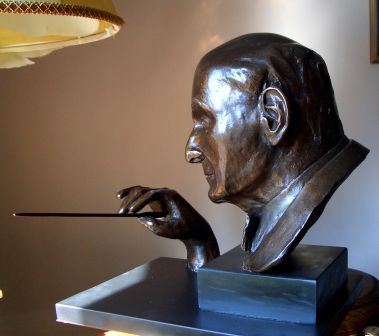 Sir Georg: Yes, because
my mind is changing.
Sir Georg: Yes, because
my mind is changing.
BD: Is it
improving?
Sir Georg: I
hope so.
BD: Are there
any pieces that you’ve played that you feel you’ve
plumbed all the depths?
Sir Georg:
There is no piece in this world that you can say that
about; only a silly musician could say, “Yes, I made it, I don’t want
anything more, I am wonderful.” A decent musician would never say
that. You always aim for something better. You always aim
for a better performance from yourself.
BD: Is it
special for you to have worked with this one orchestra for 20 seasons?
Sir Georg:
Yes. I have never been anywhere in my whole conducting career 20
years. The longest has always been 10 years. I love this
orchestra very much; that is the reason why I stay here. In
another three years I will bow out.
BD: But you
won’t abandon us completely, will you?
Sir Georg:
No, no, no! I will come back as some sort of emeritus conductor
once a year for three or four weeks, something like that, but I cannot
take as much transatlantic traveling.
*
* *
* *
BD:
Do you prepare differently for operas on stage than you do
for operas in concert?
Sir Georg:
Yes, because acoustically the conditions are
different. On stage you are full of compromises. The timing
is
different, the balance is different. It is all very
different for a concert. A good stage performance is wonderful, a
bad stage performance is terrible. One must be very careful when
one
does an opera on stage nowadays. I love opera in a concert
version
because you concentrate on the musical content, and this is so
essential. I simply love it and I do it from time to time.
BD: In opera,
what should be the balance between music and drama?
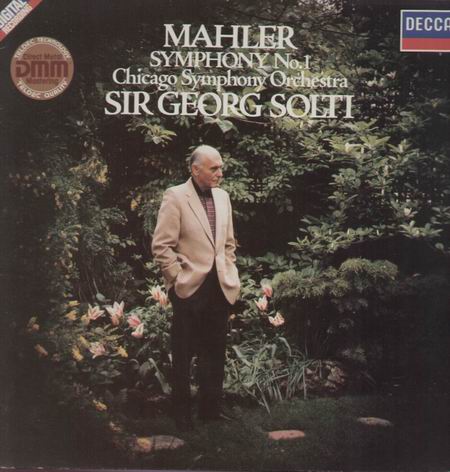 Sir Georg: There
should always be an internal balance with
staging,
music, and movements. All the time you compromise; you have
to. There is no fixed ideal of what should be soft or
loud. For example, if the singer is near the back of the stage,
they
have to give a little more sound and you have to keep the orchestra
down. This is a compromise which you learn the hard way if you
have
time. If you have the sense of
drama, if you have a sense of theater, that makes an operatic
conductor. If you know about
the stage, if you know about what an opera is; lighting,
movements,
everything; these all belong to that. Only then can you be a good
operatic conductor. You cannot come off the
street and conduct an opera; you must grow up in the opera house and
you must know what it is.
Sir Georg: There
should always be an internal balance with
staging,
music, and movements. All the time you compromise; you have
to. There is no fixed ideal of what should be soft or
loud. For example, if the singer is near the back of the stage,
they
have to give a little more sound and you have to keep the orchestra
down. This is a compromise which you learn the hard way if you
have
time. If you have the sense of
drama, if you have a sense of theater, that makes an operatic
conductor. If you know about
the stage, if you know about what an opera is; lighting,
movements,
everything; these all belong to that. Only then can you be a good
operatic conductor. You cannot come off the
street and conduct an opera; you must grow up in the opera house and
you must know what it is.
BD: Now they
seem to come from the concert halls instead.
Sir Georg:
Not many. The really good ones are growing up in the opera houses.
BD:
Are you pleased with all of the recordings you’ve made over
the years?
Sir Georg: I
am pleased with a few, but not all. Nobody’s
pleased
with all of their work. I’m quite pleased with a few, and I’m
always pleased with the latest ones because that’s my latest
child; then it is forgotten because
I never really listen to my old records.
BD: When you
do listen to a recording of a concert from 10 or 20
years ago, are you pleased or displeased?
Sir Georg: I
never listen to my records.
BD: If
someone comes up and says that they heard this record you made in 1958
and they like it...
Sir Georg: I
think that is marvelous. I’m not taking anybody’s pleasure
away. It’s very important that one records. I try to record
all the major pieces three times in my lifetime: as a young man, a
middle-age man, and as an old conductor. This is very important
because
these will be three very different aspects of what I have done.
There are some Beethoven symphonies I have recorded several times now –
very early in my conducting life, at the beginning of my Chicago life,
and now 15 or 20 years later. That makes sense.
BD: Do you do
anything differently in the recording studio than in the
concert hall?
Sir Georg:
Essentially my aim is the same: try to perform the
music
as well as possible and try to have a sort of magnetism. We also
create a spirit of mind that reminds us that what we are playing will
last a long time. For a concert we play and it’s gone, but a
recording is something that will last maybe 20, 30, 40, God knows how
many years. That responsibility gives the performance an added
something special. Something special always remains within the
inspiration of the musicians and myself during a concert. It’s a
magical chemistry, but to have that chemistry, it takes hard work first
in the rehearsal. Then there’s a chance to add something extra;
you cannot have the extra without hard work. I like recording but
it is a tremendous hardship because a recording session consists of
playing, rehearsing, playing, and making tapes. When the
orchestra has a break, I listen to the tapes, and this is more
important than the actual making to find out what I like and don’t
like. I have to quickly make up my mind what to play again and
why and how. It’s three or four hours non-stop!
BD: Is there
any chance in all of the cutting or splicing that a
record becomes too technically perfect?
Sir Georg: We
don’t cut and splice anymore, that is
old-fashioned. I record movement by movement, playing each one
three, four, or five times. I don’t believe in splicing.
One little detail will not make the recording better even if we
corrected it. The spirit of the entire movement counts, not the
little bits of it. If we have a good day on a movement and there
is one wrong note or mistake, I might correct that and not ruin the
entire tape of a good movement. We put in a bar or two, but that
is all. If I feel that two bars here should go, and another two
bars, and another two bars, then forget it – start over and do it again.
*
* *
* *
BD:
What makes a piece of music great as opposed to mediocre, or
perhaps even worse?
Sir Georg: I
think it is very easy to define that. A good
composition makes music that sounds great naturally. A very good
performance helps. When you play even the most wonderful piece of
music badly, you can take away some of its greatness but you cannot
kill it. Even the lousiest performance cannot kill Beethoven’s
Ninth Symphony. You
cannot! A good performance of
Beethoven’s Ninth Symphony
lifts you up into heaven.
BD: What are
the
ingredients of great music?
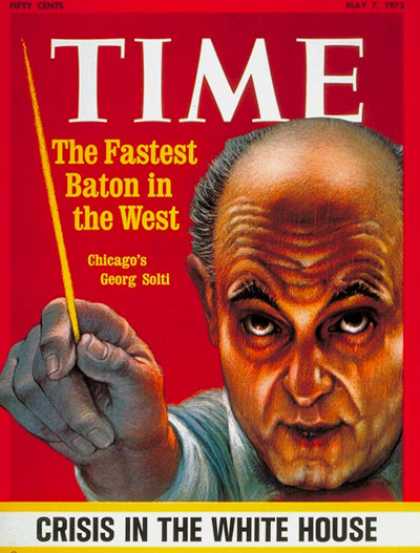 Sir Georg: A great composition,
naturally.
Great human geniuses create great music and only a few of them come
into this world. I think of Mozart, who lived only 36 years and
left behind hundreds of incredible, rich, marvelous pieces; but we
don’t know anything about who Mozart was. Nobody knows where he
was buried or what was the cause of his death, only that he was 36
years old when he died.
Sir Georg: A great composition,
naturally.
Great human geniuses create great music and only a few of them come
into this world. I think of Mozart, who lived only 36 years and
left behind hundreds of incredible, rich, marvelous pieces; but we
don’t know anything about who Mozart was. Nobody knows where he
was buried or what was the cause of his death, only that he was 36
years old when he died.
BD: Do we
really need to know those details?
Sir Georg:
No. All we really need to know is that this
genius, or angel, came to this world and left behind an incredible
amount of music. That is enough. Mozart teaches us to
believe in God because if it was possible for an angel to come down and
leave so much music behind, then there must be a superpower above who
created that. I don’t believe it’s something that happened by
chance.
BD: Are there
other composers who have this divine spirit?
Sir Georg:
Yes. Of course there are many other composers, but Mozart came
to mind because of his short life span. There was a lot of
indifference in the world then. Later, in the 19th century, a
composer became much more a subject of adoration and admiration, but I
believe that when Mozart died only a few hundred or maybe a few
thousand people knew of him, but no more than that.
BD: Is it
part of your responsibility to keep the flame of Mozart
alive?
Sir Georg:
It’s all good musicians’ responsibility, not only
mine. Every musician has a duty to keep not only Mozart, but and
all of the
other geniuses alive. There are dozens.
BD: Not
hundreds?
Sir Georg:
Probably not hundreds of great
composers. Dozens. I never counted, so I don’t
really know where to stop counting.
BD: With so
many thousands of composers trying to write music, is
there a break at some point between the great, the good, and the
mediocre?
Sir Georg:
You cannot locate such a point. There’s a
marvelous
production called Amadeus,
but the play is really about Salieri.
There is this wonderful scene when Salieri breaks down and says to God,
“What did I do? I’ve been the best son of yours, I always follow
the church; why haven’t I got the talent of Mozart? Why did you
not give me that?” Why? There’s no answer for that.
BD: Should we
then, on occasion, play the music of Salieri?
Sir Georg: I
suppose, yes. Why not? Although, unfortunately,
it’s very mediocre. I know only a little about Salieri’s
music. It is very well written,
but it doesn’t have the genius of Mozart.
BD: What
about your special affinity for Haydn and Bartók?
Sir Georg: I
have a special affinity for all major composers. I am not a
specialist. Both of these are great composers.
Bartók is a
great
20th century composer. I have a special affinity, naturally, for
the language of Bartók, coming from the same country. I
knew him personally, and that of course makes for some special
affinity. Haydn is an old favorite of mine. He was one of
the greatest composers who ever lived, but I refuse to be stamped as a
specialist. I like music from
Vivaldi to Schoenberg, everything.
BD: Are you
optimistic about the future of music?
Sir Georg: I
have always been optimistic
about the future of music and always will be. This leads to the
question of what will happen if nobody writes any music today that will
last through the 21st century. The answer is that we have enough
good music from the last 400 years that will last at least another 400
years. Why should I bother with what happens in 2420?
BD: Should we
not continue to expand the repertoire?
Sir Georg: Of
course we should continue to expand the repertoire, and I believe we
will expand the repertoire all the time. But assume the
worst; there is such an incredible amount of great music written
in the last 400 years that I can’t believe we’ll get bored and won’t
feel like playing it anymore.
*
* *
* *
BD: What
advice do you have for young conductors?
Sir Georg:
The only advice one can give is to work as hard as
possible; it is the only way to achieve something that you want.
Don’t rest on your laurels and don’t wake in the morning and say, “I
was wonderful yesterday.” See your shortcomings, strive to
improve, and if you are talented it will arrive. You always
arrive. I don’t believe we have any neglected talent
in the 20th century. That’s the only
advice I suggest. Don’t despair, it is sometimes very difficult
to go on and work, but you will learn.
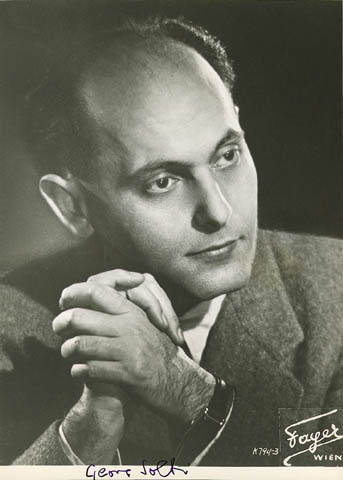 BD: Do you follow
that advice in your own career?
BD: Do you follow
that advice in your own career?
Sir Georg:
Yes, of course; I am the living example of that.
BD: What are
the shortcomings, if any, of Sir Georg Solti?
Sir Georg: I
am not a living example of shortcomings, I am a
living
example of a difficult career – the
most difficult one that you
can have. I was 34 years old when I first-time conducted.
That, for any normal conductor, is much too late. It is better to
start at 18 or 19 or 20 because there are certain technical problems
you have to overcome as early as possible. I started at 34
because of the gentleman called Mr. Adolf Hitler. A bigger
shortcoming than that cannot
be, and I overcame that one with hard work and suffering and problems.
BD:
What advice do you have for audiences that come to
concerts or operas?
Sir Georg:
Prepare yourself for a concert. Listen to a
record;
nowadays this is so easy. Don’t hear everything for the first
time, because the first time, one doesn’t like anything. Go, and
at least hear it for the second time; you will find it much more
enjoyable. American audiences still differ from European
audiences but they are improving. They are getting much more
sophisticated thanks to the radio and records that spread musical
knowledge.
BD: What is
the ultimate purpose of music in society?
Sir Georg:
The ultimate purpose is definitely a sort of mental
and
physical enjoyment. Art has, in every sphere, an unbelievable
effect on those who really want to enjoy it either visually looking at
marvelous things, or by listening. It lifts the spirit and makes
you a better human being. There’s real enjoyment in good music,
and by that I mean everything, not only 19th– or 18th–century music,
Beethoven or Brahms but also Gershwin. Good music puts you in
a better frame of mind, puts you in another, different world. If
you learn how to listen, if you learn how to enjoy music, this is one
of the most marvelous spiritual upliftings that you can have.
This is not only for professionals for but also amateurs and the
public. Real enjoyment of music comes from knowing a piece.
If you listen to a piece 2, 3, 4, or 15 times, you’ll find it better
and
better and more enjoyable. That is the advice that I give to any
listening public. Remember at a concert not to listen
for the first time – it’s no good. It is easy to broaden
knowledge, so buy a gramophone record or listen to the radio and then
go to
concerts. It is not that the record is better than the
concert. Nothing surpasses live music. Prepare yourself
and you’ll find a fantastic new dimension.
BD: One last
question: Is conducting fun?
Sir Georg:
Fun??? Oh, great fun. I wouldn’t do it
otherwise. It’s the greatest fun. Good music is
the greatest joy of my life.
===== ===== ===== =====
=====
------- ------- ------- -------
===== ===== ===== =====
=====
Bruce Duffie has interviewed nearly 1,000 musicians for his radio show
on WNIB, Classical 97, in Chicago. As a host of hundreds of
full-length opera broadcasts, Duffie knows the material well and
lectures for the Lyric Opera and teaches adult education classes in the
Chicago area. Duffie earned a bachelor of music education degree
from Illinois Wesleyan University and a master of music degree from
Northwestern University and taught for two years before turning to
radio.
© 1988 Bruce Duffie
These interviews were recorded in Chicago on May 11 and October
10 of 1988. Portions
were used (along with recordings) on WNIB later that year and again in
1990, 1991, 1992 and 1997.
A portion was also featured on the nationally syndicated series Lincoln’s Music in America
during the last week of October, 1988. The transcription was made
and used as the cover article in The
Instrumentalist magazine in October of 1995. It was
slightly re-edited in 2009 and posted on this website at
that time.
To see a full list (with links) of interviews which have been
transcribed and posted on this website, click here.
Award
- winning
broadcaster Bruce Duffie was with WNIB, Classical 97 in Chicago
from 1975 until its final moment as a classical station in February of
2001. His interviews have also appeared in various magazines and
journals since 1980, and he now continues his broadcast series on WNUR-FM,
as well as on Contemporary Classical Internet Radio.
You are invited to visit his website
for more information about his work, including selected transcripts of
other interviews, plus a full list of his guests. He would also
like
to call your attention to the photos and information about his
grandfather, who was a pioneer in the automotive field more than a
century ago. You may also send him E-Mail
with comments, questions and suggestions.



 BD: Well, when you
prepare for a concert, is all your work done in the rehearsals or do
you leave something for the spark of the evening?
BD: Well, when you
prepare for a concert, is all your work done in the rehearsals or do
you leave something for the spark of the evening? Sir Georg: Yes, because
my mind is changing.
Sir Georg: Yes, because
my mind is changing.  Sir Georg: There
should always be an internal balance with
staging,
music, and movements. All the time you compromise; you have
to. There is no fixed ideal of what should be soft or
loud. For example, if the singer is near the back of the stage,
they
have to give a little more sound and you have to keep the orchestra
down. This is a compromise which you learn the hard way if you
have
time. If you have the sense of
drama, if you have a sense of theater, that makes an operatic
conductor. If you know about
the stage, if you know about what an opera is; lighting,
movements,
everything; these all belong to that. Only then can you be a good
operatic conductor. You cannot come off the
street and conduct an opera; you must grow up in the opera house and
you must know what it is.
Sir Georg: There
should always be an internal balance with
staging,
music, and movements. All the time you compromise; you have
to. There is no fixed ideal of what should be soft or
loud. For example, if the singer is near the back of the stage,
they
have to give a little more sound and you have to keep the orchestra
down. This is a compromise which you learn the hard way if you
have
time. If you have the sense of
drama, if you have a sense of theater, that makes an operatic
conductor. If you know about
the stage, if you know about what an opera is; lighting,
movements,
everything; these all belong to that. Only then can you be a good
operatic conductor. You cannot come off the
street and conduct an opera; you must grow up in the opera house and
you must know what it is.  Sir Georg: A great composition,
naturally.
Great human geniuses create great music and only a few of them come
into this world. I think of Mozart, who lived only 36 years and
left behind hundreds of incredible, rich, marvelous pieces; but we
don’t know anything about who Mozart was. Nobody knows where he
was buried or what was the cause of his death, only that he was 36
years old when he died.
Sir Georg: A great composition,
naturally.
Great human geniuses create great music and only a few of them come
into this world. I think of Mozart, who lived only 36 years and
left behind hundreds of incredible, rich, marvelous pieces; but we
don’t know anything about who Mozart was. Nobody knows where he
was buried or what was the cause of his death, only that he was 36
years old when he died.  BD: Do you follow
that advice in your own career?
BD: Do you follow
that advice in your own career?